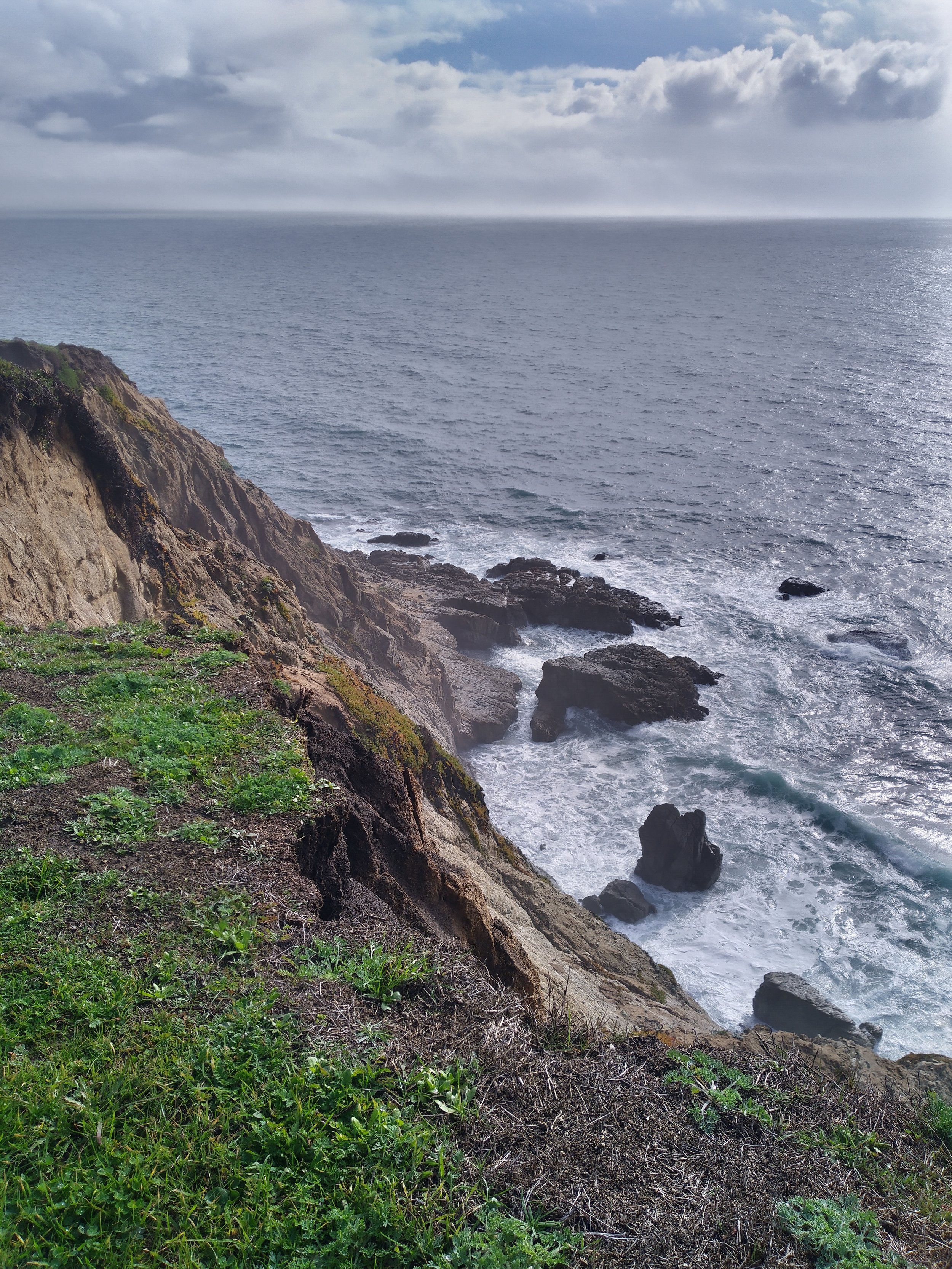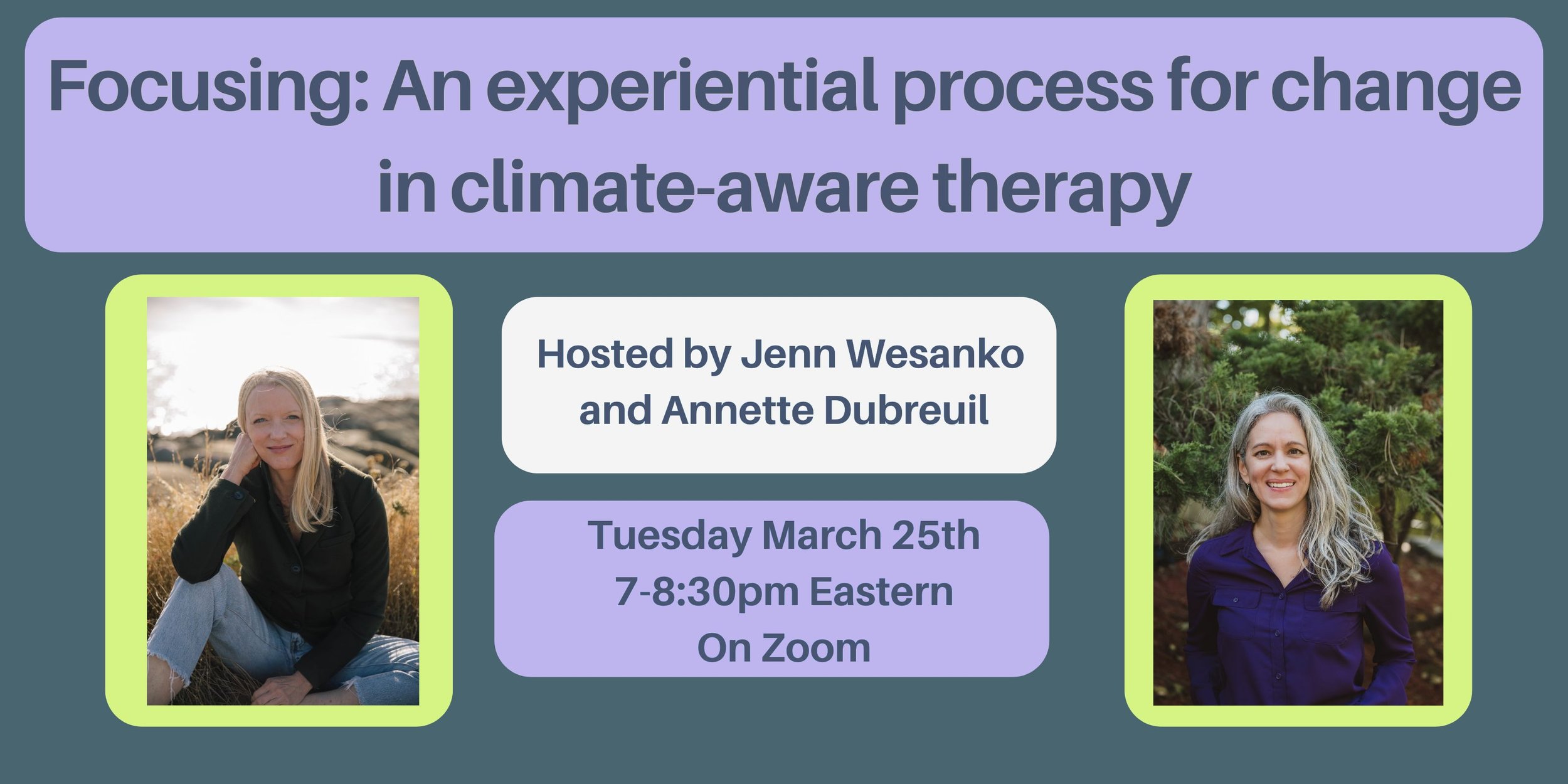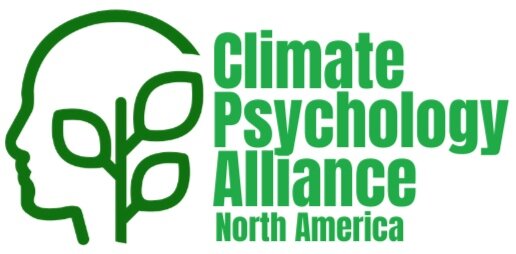
CPA-NA Sponsored Discussion Groups, Workshops & Trainings
We rarely record events due to the personal nature of attendees sharing opportunities. We occasionally record if we’re hosting a speaker. If you’d like to see available recordings of previous talks and workshops, watch them here.

Don’t Say Climate? Bridging Divides with Katharine Hayhoe
Join us in learning how to have conversations about climate in this polarizing time.

May Daytime Linking Conversations
Join CPA-NA's bi-monthly drop-in conversation called “Linking Conversations.” We will think and talk together about what’s happening in the world–such as extreme weather, political moments, and cultural flashpoints–and about linking thought and action, being and doing, the internal and external worlds.

May 2025 New Member Meet and Greet with the CPA-NA Co-Presidents
If you are new to the organization, please join us for an informal gathering where we can all meet each other, ask questions and share ideas about how to get involved in CPA-NA!

Resilience Tools for Scientists: Facing an Uncertain Future
This group is designed to build solidarity, metabolize uncertainty, face moral injury and increase resilience among scientists, engineers, science communicators, science instructors and professors, postdocs, and students in the sciences - particularly those struggling with the burden of knowing the impacts of climate change.

Unnaming Climate: Authoritarianism, Collective Trauma & Imperfect Solidarity
Our group of speakers will address collective trauma and the polycrisis. Moderated by Sarah Jaquette Ray, the speakers will discuss how the climate crisis has been mobilized in service of authoritarian nationalism, anti-immigrant xenophobia and misogyny.

June Evening Linking Conversation - East Coast
Join CPA-NA's bi-monthly drop-in conversation called “Linking Conversations.” We will think and talk together about what’s happening in the world–such as extreme weather, political moments, and cultural flashpoints–and about linking thought and action, being and doing, the internal and external worlds.

June Evening Linking Conversations - West Coast
Join CPA-NA's bi-monthly drop-in conversation called “Linking Conversations.” We will think and talk together about what’s happening in the world–such as extreme weather, political moments, and cultural flashpoints–and about linking thought and action, being and doing, the internal and external worlds.

Climate-Informed Disaster Behavioral Health Overview
Climate change is not a problem for some future generations; it is affecting us now. We are the first generation of climate-informed mental health professionals.

Psychological First Aid
Psychological First Aid (PFA) is an evidence-informed behavioral health intervention that is used to help people experiencing stress to reduce their symptoms and improve functioning.

July Daytime Linking Conversations
Join CPA-NA's bi-monthly drop-in conversation called “Linking Conversations.” We will think and talk together about what’s happening in the world–such as extreme weather, political moments, and cultural flashpoints–and about linking thought and action, being and doing, the internal and external worlds.

July 2025 New Member Meet and Greet with the CPA-NA Co-Presidents
If you are new to the organization, please join us for an informal gathering where we can all meet each other, ask questions and share ideas about how to get involved in CPA-NA!

Disaster Mental Health from a Collective Lens: Trauma/Post-traumatic Growth
This module explores a community-centered approach to disaster mental health, emphasizing the role of connection, culture, and shared co-regulation in trauma recovery.

August Evening Linking Conversation - East Coast
Join CPA-NA's bi-monthly drop-in conversation called “Linking Conversations.” We will think and talk together about what’s happening in the world–such as extreme weather, political moments, and cultural flashpoints–and about linking thought and action, being and doing, the internal and external worlds.

August Evening Linking Conversations - West Coast
Join CPA-NA's bi-monthly drop-in conversation called “Linking Conversations.” We will think and talk together about what’s happening in the world–such as extreme weather, political moments, and cultural flashpoints–and about linking thought and action, being and doing, the internal and external worlds.

Navigating the Disaster Behavioral Health Response System
This program is intended to introduce potential responders to the structure and terminology of the disaster response environment and help them form a common operating picture to facilitate the delivery of psychosocial support following disasters.

September Daytime Linking Conversations
Join CPA-NA's bi-monthly drop-in conversation called “Linking Conversations.” We will think and talk together about what’s happening in the world–such as extreme weather, political moments, and cultural flashpoints–and about linking thought and action, being and doing, the internal and external worlds.

September 2025 New Member Meet and Greet with the CPA-NA Co-Presidents
If you are new to the organization, please join us for an informal gathering where we can all meet each other, ask questions and share ideas about how to get involved in CPA-NA!

October Evening Linking Conversation - East Coast
Join CPA-NA's bi-monthly drop-in conversation called “Linking Conversations.” We will think and talk together about what’s happening in the world–such as extreme weather, political moments, and cultural flashpoints–and about linking thought and action, being and doing, the internal and external worlds.

October Evening Linking Conversations - West Coast
Join CPA-NA's bi-monthly drop-in conversation called “Linking Conversations.” We will think and talk together about what’s happening in the world–such as extreme weather, political moments, and cultural flashpoints–and about linking thought and action, being and doing, the internal and external worlds.

November Daytime Linking Conversations
Join CPA-NA's bi-monthly drop-in conversation called “Linking Conversations.” We will think and talk together about what’s happening in the world–such as extreme weather, political moments, and cultural flashpoints–and about linking thought and action, being and doing, the internal and external worlds.

November 2025 New Member Meet and Greet with the CPA-NA Co-Presidents
If you are new to the organization, please join us for an informal gathering where we can all meet each other, ask questions and share ideas about how to get involved in CPA-NA!

December Evening Linking Conversation - East Coast
Join CPA-NA's bi-monthly drop-in conversation called “Linking Conversations.” We will think and talk together about what’s happening in the world–such as extreme weather, political moments, and cultural flashpoints–and about linking thought and action, being and doing, the internal and external worlds.

December Evening Linking Conversations - West Coast
Join CPA-NA's bi-monthly drop-in conversation called “Linking Conversations.” We will think and talk together about what’s happening in the world–such as extreme weather, political moments, and cultural flashpoints–and about linking thought and action, being and doing, the internal and external worlds.

The Climate Emotions Mandala Project: A Creative Call to Action
We invite participants of all ages and artistic abilities to reflect on their emotional responses to the planetary crisis.

April Evening Linking Conversations - West Coast
Join CPA-NA's bi-monthly drop-in conversation called “Linking Conversations.” We will think and talk together about what’s happening in the world–such as extreme weather, political moments, and cultural flashpoints–and about linking thought and action, being and doing, the internal and external worlds.

April Evening Linking Conversation - East Coast
Join CPA-NA's bi-monthly drop-in conversation called “Linking Conversations.” We will think and talk together about what’s happening in the world–such as extreme weather, political moments, and cultural flashpoints–and about linking thought and action, being and doing, the internal and external worlds.

Focusing: An Experiential Process for Change in Climate-Aware Therapy
This interactive workshop invites participants to experience and explore Focusing – a bottom-up (somatic) process.

March Daytime Linking Conversations
Join CPA-NA's bi-monthly drop-in conversation called “Linking Conversations.” We will think and talk together about what’s happening in the world–such as extreme weather, political moments, and cultural flashpoints–and about linking thought and action, being and doing, the internal and external worlds.

Climate Emotional Resilience Program for Scientists and STEM Professionals
This group is designed to build solidarity and alleviate burnout for scientists, engineers, science communicators, students in the sciences and other STEM professionals involved with or aware of the technical aspects of climate change.

Drop-in Support for Clinicians: the L.A. Wildfires and Other Climate Catastrophes
This informal group will provide a space for psychotherapists to come together to share how we are doing in the face of increasingly frequent and unfolding climate and environmental catastrophes.

Feb. Evening Linking Conversations - West Coast
Join CPA-NA's bi-monthly drop-in conversation called “Linking Conversations.” We will think and talk together about what’s happening in the world–such as extreme weather, political moments, and cultural flashpoints–and about linking thought and action, being and doing, the internal and external worlds.

Feb 2025 New Member Meet and Greet with the CPA-NA Co-Presidents
If you are new to the organization, please join us for an informal gathering where we can all meet each other, ask questions and share ideas about how to get involved in CPA-NA!

Feb. Evening Linking Conversation - East Coast
Join CPA-NA's bi-monthly drop-in conversation called “Linking Conversations.” We will think and talk together about what’s happening in the world–such as extreme weather, political moments, and cultural flashpoints–and about linking thought and action, being and doing, the internal and external worlds.

Liberation Psychology: A Dialogue in the Current Moment
What is liberation psychology, and what insights does it hold for navigating the climate crisis?

Daytime Linking Conversations Jan 2025
Join CPA-NA's bi-monthly drop-in conversation called “Linking Conversations.” We will think and talk together about what’s happening in the world–such as extreme weather, political moments, and cultural flashpoints–and about linking thought and action, being and doing, the internal and external worlds.

CPA-NA Winter Solstice Gathering
Please join us for a chance to connect as the season changes.

Evening Linking Conversations - West Coast
Join CPA-NA's bi-monthly drop-in conversation called “Linking Conversations.” We will think and talk together about what’s happening in the world–such as extreme weather, political moments, and cultural flashpoints–and about linking thought and action, being and doing, the internal and external worlds.

Evening Linking Conversations - East Coast
Join CPA-NA's bi-monthly drop-in conversation called “Linking Conversations.” We will think and talk together about what’s happening in the world–such as extreme weather, political moments, and cultural flashpoints–and about linking thought and action, being and doing, the internal and external worlds.

Embodying Climate Justice with Rae Johnson, PhD
This interactive session invites participants to explore the principles of climate justice through embodied practices, fostering a deeper connection between personal, social, and environmental well-being.

What's Next After the 2024 Election?
We don’t yet know the outcome of the 2024 elections, but we already know enough to feel the polycrisis intensifying. In response to multiple crisis points, the dangerous threat of fascism is real. No matter what happens, let’s come together, connect and take stock. Brought to the brink, how are we feeling? Where do we go from here in our work? Join us for this FREE Members-only event.

New Member Meet and Greet with the CPA-NA Co-Presidents
If you are new to the organization, please join us for an informal gathering where we can all meet each other, ask questions and share ideas about how to get involved in CPA-NA!

Daytime Linking Conversations
Join CPA-NA's bi-monthly drop-in conversation called “Linking Conversations.” We will think and talk together about what’s happening in the world–such as extreme weather, political moments, and cultural flashpoints–and about linking thought and action, being and doing, the internal and external worlds.

How to Teach, Learn, & Process Climate Anxiety & the Toxic Knowledge of Climate Injustice with College-age Students
Join the Climate Psychology Alliance of North America for the third installment in our Fall ’24 Planting the Future Fundraiser Distinguished Speaker’s Series - an exciting and inspiring workshop, interview and Question and Answer session with Sarah Jaquette Ray, for practical tips for therapists and faculty working with young adults who are awakening to the climate crisis.

"What to Do When Climate Change Scares You": Strategies for Supporting Children ages 6-12 in the Clinic and Classroom
This event will showcase the new book What To Do When Climate Change Scares You: A Kid's Guide to Dealing with Climate Change Stress written by Leslie Davenport, MFT.

Climate Café by CPA-NA
Do you have some feelings about climate change? Join us to talk about them and make them more bearable.

Evening Linking Conversations - West Coast
Join CPA-NA's bi-monthly drop-in conversation called “Linking Conversations.” We will think and talk together about what’s happening in the world–such as extreme weather, political moments, and cultural flashpoints–and about linking thought and action, being and doing, the internal and external worlds.

Evening Linking Conversations - East Coast
Join CPA-NA's bi-monthly drop-in conversation called “Linking Conversations.” We will think and talk together about what’s happening in the world–such as extreme weather, political moments, and cultural flashpoints–and about linking thought and action, being and doing, the internal and external worlds.

Planting the Future Speaker Series: Building in Psychological Tools & Well-being into Parenting and the K-College Environmental Science Curriculum
Please Join us for CPA-NA’s Planting the Future Fall ‘24 Fundraising Saturday Distinguished Speakers Series

Climate Emotions in the K-12 Classroom: A Cross-Generational Conversation
Join Kate Schapira and Carolyn McGrath as they discuss climate emotions, how they show up in the classroom, and how teachers and counselors can help students work with and through them.

New Member Meet and Greet with the CPA-NA Co-Presidents
If you are new to the organization, please join us for an informal gathering where we can all meet each other, ask questions and share ideas about how to get involved in CPA-NA!

Daytime Linking Conversations
Join CPA-NA's bi-monthly drop-in conversation called “Linking Conversations.” We will think and talk together about what’s happening in the world–such as extreme weather, political moments, and cultural flashpoints–and about linking thought and action, being and doing, the internal and external worlds.

Evening Linking Conversations - West Coast
Join us for a salon-style meeting to talk about what's happening in the world.

Evening Linking Conversations - East Coast
Join us for a salon-style meeting to talk about what's happening in the world.

